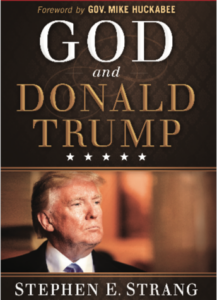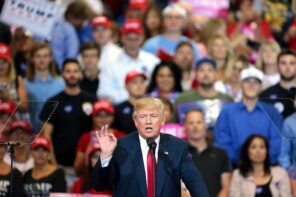There is no dispute that, by and large, the Christian right loves Donald Trump. The question instead has been how men and women who claim to be motivated by “moral” issues support such a demonstrably immoral person. This support becomes even more baffling when you consider that all the stones they often (rightfully) fling at the Clintons—lying, cheating, womanizing—are enacted tenfold by the quiff from Queens.
The answer seems to lie in the power of rationalization. Now, to some extent, we’re all guilty of rationalization—“I deserve another Moscow Mule; after all, it’s New Year’s”—but when we’re talking about Trump we’re pushing the limits of human unreason. I’m reminded of Bob Dylan’s Idiot Wind, in which he contends against a stupidity so massive it sweeps like the jet stream across the American continent, “from the Grand Coulee Dam / To the Capitol.”

I came to these conclusions—and a feeling of astonished helplessness in the face of such willful moral blindness—after reading Stephen E. Strang’s God and Donald Trump. Strang is the brains behind Charisma Media, publisher of riveting periodicals like Christian Retailing. In the literary realm, Strang is responsible for the The Bible Cure, which conveys the good book’s advice on weight loss; and The Paradigm, a “messianic rabbi’s” musings on how America’s “moral decline” echoes that of the ancient kingdom of Israel. Strang, in short, is one of those guys who makes his fortune by peddling connections, however tenuous, between the zeitgeist and the Bible.
With God and Donald Trump, Strang himself takes pen to paper to “explore the spiritual dimensions of the 2016 presidential election, and to determine what role faith and the religious impulse may have played in Trump’s unlikely win.” His answer, of course, is that faith had everything to do with it. Trump is in fact a man of sound Christian ethics, and in these desperate hours—for the hours are always desperate for conservatives—the Lord, in His infinite wisdom, has chosen Donald Trump as our political and spiritual savior.
I was particularly interested to see how Strang, and thus some portion of the American electorate, justifies his justification for Trump, as it were. After a careful reading of God and Donald Trump—and may the Lord strike me with leprosy if I ever pitch such a piece again—I think I have it figured out.
First, before you can believe that the guy who sued his contractors rather than pay them is a prime example of American decency, it helps to believe in conspiracy theories. For Strang isn’t merely anti-gay marriage or anti-abortion (two topics that Trump didn’t care much about until it was politically expedient), he also believes that “the left” is actively trying to undermine the very foundations of American democracy.
The United States, he says, is being eroded from within by a “deep state” comprised of the “bureaucracy, the lobbyists, insiders, and even the intelligence agencies.” I presume that this doesn’t include gun lobbyists and insiders like Mike Huckabee, who wrote the introduction to God and Donald Trump. Because for Strang, the deep state seems to be synonymous with the Democratic party, which, he claims, engaged in wide-scale election fraud: “I’ve heard some experts suggest that if there had been no illegal voting in the 2016 election, Trump would also have won the popular vote.” These experts, alas, are never named, and unless Trump lost by 3 votes the data don’t really comply.
These “demonic” schemes go right to the top: both President Obama and Hilary Clinton were “mentored” by radical sixties activist Saul Alinsky, who “taught that the historic framework of democracy in America must be destroyed.” Obama’s mentoring must have been particularly interesting, since Alinsky died in 1972, when the future president was eleven. More recently, there is the grave threat posed by “hard-left groups” like Black Lives Matter, which is “funded by Hungarian billionaire and former Nazi collaborator George Soros.”
And what is their ultimate goal? The “one world order” perpetrated by that renowned lefty radical George H.W. Bush—a global government, I’m guessing, that dispenses abortions, pornography and same-sex marriage certificates like Pez.
It’s no surprise that the Christian right would look for a savior in such parlous times. Which leads us to Strang’s assertion that, despite massive evidence to the contrary, Trump is actually a good guy. Thus the author must now convince the reader, and presumably himself, that Trump has some kind of religious impulse.
So how do we know that the president has Christian values? Well, he doesn’t like alcohol, tobacco and recreational drugs. (note: Hitler was a vegetarian.). and in Sunday school, Trump had an “education in biblical imperatives.” He was “even awarded a Bible at his confirmation in 1959.”
Strang then trots out the president’s famous friendship with minister Norman Vincent Peale, author of The Power of Positive Thinking. A close relationship with a clergyman might actually be compelling, until you consider that Vincent Peale’s teachings were closer to The Secret than the Sermon on the Mount. And never mind that Trump usually only sees the inside of a church at one of his own weddings. For good measure, Strang also quotes James Dobson, who famously said that the president is “a baby Christian.” At least he got it half right.
Trump, according to Strang, is a prime example of the American Dream. The president grew up “middle-class in Queens” and then learned the building business “from the bottom up,” surpassing “his father’s accomplishments many times over.” Trump, in other words, earned his own way to the golden toilets of Mar-A-Lago, never mind the $1 million loan, the connections, or the $40 million inheritance that all came from his father.
God and Trump is a terrible book, but it is an important book, in its way, for those of us struggling to understand how Christians can support a moral cretin like President Trump.
Still, I think Strang left some stuff out. Because unlike the alt-right, which is pretty forthright about its ideals, most high-profile Trump supporters, Christian or otherwise, are not intellectually honest. If they were, we’d see a book explaining what’s really behind all this cynical piety: that they want a white man in the White House, that they want conservative Christian values to be codified into law, that they want to hang onto their cash, and that everybody else can go to hell. Perhaps literally.





